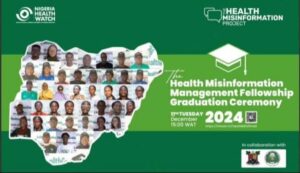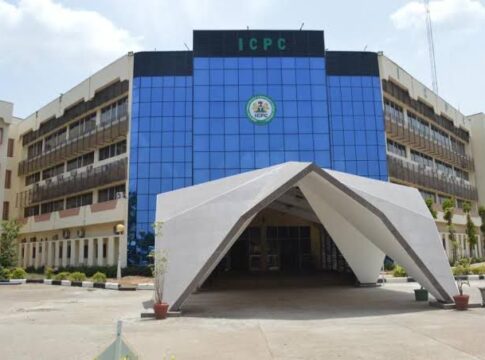Nigeria Health Watch, a non governmental health advocacy and communication institution, is poised in closing the lacuna between reality and effort to amplify health outcomes across Nigeria.
In a release about the graduation ceremony of their fellows, they pointed out a pressing issue: the rise of health misinformation. Such misinformation has increasingly threatened public health, leading to unguided decisions, vaccine hesitancy, and lack of trust in healthcare systems and professionals.
Since the inauguration of its fellowship program to tackle health misinformation in 2023, Nigeria Health Watch has collaborated with a diverse range of stakeholders. They have successfully completed the second and third tracks of this program, empowering key players such as social media influencers, creatives, bloggers, along with healthcare professionals like nurses, midwives, traditional birth attendants, community pharmacists, and health educators.
READ MORE: Mahama’s Comeback: Ghana’s Next President Pledges $10 Billion Infrastructure Push
The target is to provide these stakeholders with tools to effectively counter misinformation, promote evidence-based health narratives, and foster public trust.
The Fellowship consists of three interconnected tracks:
- Health Misinformation Management Fellowship:Trains influencers, bloggers, and creatives to create accurate and engaging health content while combating false information online.
- Health Workers Misinformation Fellowship: Enhances skills among healthcare providers to identify, address, and mitigate misinformation in their networks.
- Lagos State Health Educators Fellowship: Focuses on Health Promotion Officers in Lagos to drive community engagement and grassroots mobilization against misinformation.
Key Achievements:
1. Content Creation and Digital Engagement:Fellows produced over 168 health-focused content pieces, gaining more than 56,000 views and nearly 63,000 interactions.
2.Community Outreach:Participants organized grassroots educational campaigns, visiting schools, communities, and healthcare facilities.
3. Lagos Community Impact: Health Promotion Officers in three Lagos districts developed district-specific action plans and utilized local expertise for sustainable impact.
4.Behavioral and Knowledge Shifts: A 31% increase in audience understanding of misinformation was achieved.The fellowship used a hybrid model with in-person sessions, virtual workshops, and hands-on activities, all anchored in adult learning principles for practical application.

During the program’s opening, Nigeria Health Watch’s Managing Director, Vivianne Ihekweazu, emphasized the importance of collective efforts to combat misinformation and amplify credible information.
“This fellowship is not just a program; it is a movement,” Ihekweazu stated. “Today, we celebrate our fellows who are now equipped to play a vital role in addressing health misinformation and fostering trust.”
At the graduation ceremony, social media influencer Stephanie Omoarebun highlighted the fellowship’s critical role in empowering communities with accurate information. “We are proud to have contributed to advancing accurate health information. It’s a responsibility we carry with pride and commitment,” she stated.
In her keynote, Fatou Wurie stressed that trust is the most potent tool to influence public health positively. “Trust, once it is built, is stronger than fear,” she remarked.
The event culminated with the announcement of the Health Information Disorder Management Network. This initiative, led by the Director of Programmes, Dr. Kemisola Agbaoye, aims to sustain the fellowship’s efforts by facilitating collaboration, innovation, and knowledge sharing to promote accurate health communication on a larger scale. Links for interested parties to join this collaborative network were provided.




